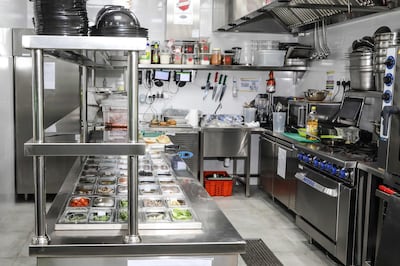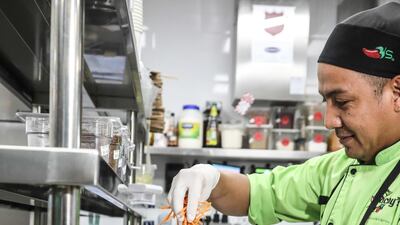It’s a well-worn cliché, but sometimes the simplest ideas really are the best, especially when it comes to business. Just when you think you’ve seen it all, along comes a new concept that’s so blindingly obvious you scratch your head in disbelief, wondering why nobody (specifically, you) had thought of it before. Deliveroo, which is now present in 12 countries and more than 200 cities, is just such a company.
Even if you haven’t yet used the food ordering app or website, you’ll have seen the delivery motorcyclists zipping through the streets, couriering food to customers’ homes and offices from the restaurants that have signed up for the service. Deliveroo takes a commission from the supplier and applies a small delivery charge to each end user, and yet remains responsible for the safety and quality of the produce delivered. So it pays for the UK-headquartered company to work closely with its partners to ensure standards across the board remain unimpeachable.
The beauty of the service is that restaurants – particularly the smaller, non-chain variety – can meet the requirements of customers who either cannot or don’t want to visit their premises to dine. It’s demanding enough running any kind of catering establishment without having to worry about deliveries, so Deliveroo (like its rivals, such as Uber Eats) takes care of that for them. But nine months ago it took that concept and made it even more embracing, with the opening of its first ‘Editions’ facility in the UAE, located in Dubai’s Jumeriah Lakes Towers.

Editions in JLT was, and continues to be, a single site with six kitchens that are occupied by staff from various restaurants that want to be able to have their meals delivered to customers but don’t necessarily have the capacity at existing premises, or want to invest in new ones. So they team up with Deliveroo, sign a tenancy agreement and specify what their requirements will be for the kitchen areas.
Deep fat fryers, industrial gas hobs – whatever they want (within reason), Deliveroo provides. And that’s on top of the order and payment processing, the deliveries, doing the washing up and keeping the place spotlessly clean. It’s the ultimate low-risk expansion programme for a restaurant and all Deliveroo expects is a higher than normal commission rate for being there. And now there’s a new one, in Business Bay, with eight kitchens that are already signed up for and doing business.
Deliveroo’s general manager for the GCC is a man called Anis Harb and, donning a fetching black hair net, he invites The National to take an exclusive look around the new Editions facility. It’s 9am and the place has just opened, with a couple of kitchens busy preparing breakfast orders that will no doubt be sped to nearby offices and conference rooms as soon as they’re boxed up. But Harb says things really kick off around lunchtime and early evening.
“We invite partners in,” he explains, “that want to reach customers within a ten minute drive from the facility. So from our JLT place, it was ideal for businesses that were based at the other end of the city but wanted to serve customers in both JLT and the Marina, that they couldn’t service before.”
Being a tech-driven company, he says, makes Deliveroo unique in the catering industry. Untold amounts of invaluable data have been collected over the years regarding not only existing customer habits but their unfulfilled culinary delivery desires, too. So there’s no way a British Fish n’ Chips restaurant would be invited in if there wasn’t demonstrable demand in the area in question. That there are two vegan brands, a Thai restaurant, health food specialists, Greek, Vietnamese, sushi and purveyors of all things organic, as well as a host of others, all based at Deliveroo’s state of the art kitchens says a great deal about the diversity of the surrounding residents and workers. There really is something for everyone and the numbers evidently stack up.
_______________
Read more:
Deliveroo brings its new kitchen concept to Dubai
UberEATS, Deliveroo, and Carriage: Which delivery app will reign in Abu Dhabi?
Apps deliver the food and results for UAE restaurants
_______________
“They come in and do what they do best, we take care of the rest,” quips Harb, who says that the JLT operation has proved to be extremely smooth and successful, attributing lessons learned globally that are all fed through the organisation. “London was the first, about 18 months ago. And we’ve been opening them up in Paris, Australia and Hong Kong, with all the data gathered as a result at our disposal, so we know what to do and what not to do.”
And that gathering of data will never stop. If you go onto Deliveroo’s site or app, your searches are all registered so the company knows what you want. They know what customers are happy with and, crucially, what they’re not. If there’s data to support expansion into Sharjah or other northern emirates, you can rest assured it’ll be considered and Harb confirms that already a third location is being settled on now. Could it be Abu Dhabi? He won’t say but, again, if the data shows it’ll work in the capital, why not?
Each kitchen is given a thorough clean before shifts commence, with Deliveroo’s staff taking care of that, and they do the dishes too. “We’ve actively encouraged a community feel here,” he smiles, “so when one team is inundated with orders and struggling to meet demand, those who are less busy roll up their sleeves and help. The next day the favour might be repaid, we just do whatever it takes to get the job done and the customers kept satisfied.”
Simple, right? As an idea, as a concept, certainly. But the complexities behind the scenes are mind-boggling and, thankfully for Deliveroo’s restaurant partners, delivery riders and hungry customers, they’re all someone else’s headache. For smaller, independent restaurateurs, this could be a brilliant stepping-stone and that, ultimately, will help boost the economy (along with the nation’s waistlines).

